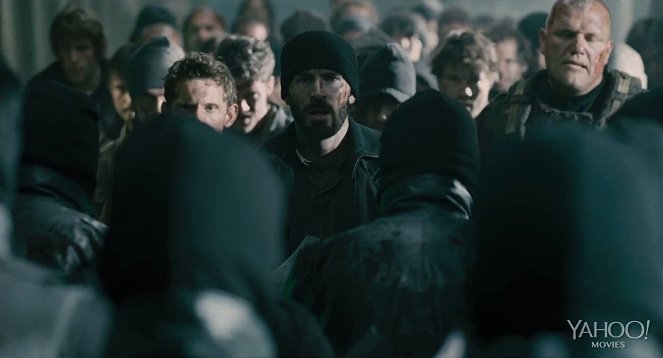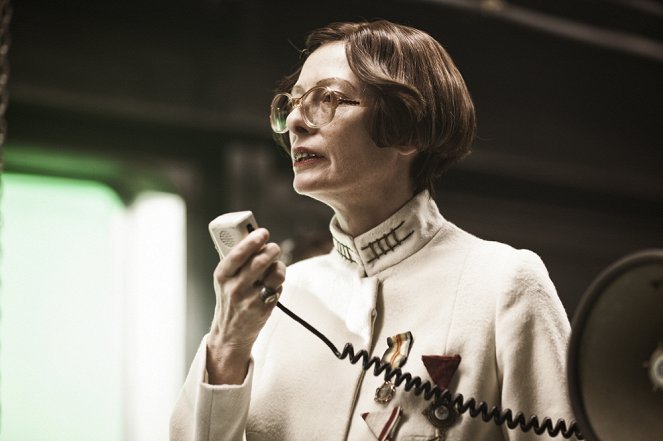Réalisation:
Joon-ho BongPhotographie:
Kyung-pyo HongMusique:
Marco BeltramiActeurs·trices:
Chris Evans, Kang-ho Song, Jamie Bell, Tilda Swinton, Octavia Spencer, John Hurt, Ewen Bremner, Alison Pill, Ed Harris, Ah-seong Ko, Kenny Doughty (plus)VOD (1)
Résumés(1)
« Contrôler la Machine, c’est contrôler le Monde ! » 2031. Nouvelle ère glaciaire. Les derniers survivants ont pris place à bord du Snowpiercer, un train gigantesque condamné à tourner autour de la terre sans jamais s’arrêter. Mais l’être humain ne changera jamais… (Wild Side Films)
Vidéo (5)
Critiques (16)
Une comédie de science-fiction postapocalyptique, d'une qualité inédite et fonctionnant selon un principe séduisant - les héros se déplacent des wagons arrière d'un long train jusqu'aux wagons avant, et une surprise les attend dans chacun d'entre eux. Par sa structure, le film rappelle un jeu vidéo et parvient à divertir pendant près de deux heures grâce à ses acteurs de qualité (la distribution est incroyable), à sa superbe réalisation visuelle et à la performance magistrale du réalisateur. En bref, un voyage spectaculaire, original et intelligent avec une connotation philosophique, qui malheureusement s'essouffle un peu vers la fin.
()
Mutant, from the same director, was also incredibly hyped abroad, but for me it was an unwatchable, stupid piece of crap, so I went into Snowpiercer with some healthy apprehension. The result, however, blew me away. There are some shortcomings, like the almost video-game like special effects (when we see the train from the outside, or the frozen landscape), or the ending, which I personally would cut three minutes earlier, but I’m willing to forgive them. At first I was afraid that the premise of a post-apocalyptic train riot wouldn’t be enough for a two hour film. But it is. The passage from one car to the next is a little monotonous, but it’s saved by the dirty atmosphere, the sharp action and the excellent performances (especially Tilda Swinton’s, while I felt Octavia Spencer was the weakest link of the ensemble). About half-way through, we start getting a relentless barrage of directorial ideas, plot twists, brutal and unexpected deaths (the film doesn’t go easy on its stars, in this regard Joon-ho Bong is quite uncompromising), brutality and slightly philosophical thoughts, and I was purring in satisfaction. I have a weak spot for dystopian sci-fi and this movie checked all the boxes. And, as a Czech viewer, I was happy to hear that one sentence in Czech, and the Czech names in the credits. The film was made in Barrandov Studios :)
()
Once I ignore a whole lot of nonsense (for example, the fact that I couldn’t technically imagine the train or what the purpose of the people at the end of the train was), it’s actually a pretty decent sci-fi that has a hint of murder-movie atmosphere until the very end. However, it’s still an interesting idea, a good execution and a surprise in the form of a single Czech sentence said by some Asian woman.
()
Snowpiercer is one of the purest transferences of video-game narrative structure into film. The protagonists constantly advance, progressing from bare-knuckle fighting to cutting weapons and fire to guns and explosives. Each rail car (mission) has a distinctly different design, and we can also understand the POV shots with night-vision goggles as a reference to the game’s aesthetic. After every action there is a reward in the form of plot-shaping information about one of the characters and their motivations (which vary – children, drugs, revenge – thanks to which we can clearly separate the individuals from the united group). ___ However, the narrative’s clarity and fluidity are due not only to the fact that it is broken up into many smaller parts. Though it is absolutely clear from the beginning where the plot is going (yes, forward), we are constantly kept in a state of anticipation and surprised by the various hints, diversions and ellipses (for example, we may incorrectly believe that the rabble at the end of the train are missing limbs because those limbs have “frozen to death”). ___ Besides creative contrasts (the colourful “shock” in the form of a school classroom), the straightforward paving of the way forward is livened up by unexpected incursions of other genres (a brutal massacre interrupted by the welcoming of the new year, a musical interlude with children) and by the characters’ unconventional behaviour (not all positive heroes always behave “humanly”). Bong doesn’t tell us anything that we don’t (or won’t) need to know in order to understand the protagonist and the main storyline connected to him and every seemingly superfluous item of information, conveyed verbally or visually, is utilised sooner or later (the matches, the snowflake, the polar bear, other characters’ conversations with Curtis). ___ The speed with which the individual rail cars alternate corresponds to the amount of information that has to be shared. At the midpoint of the film, Curtis correctly says “I can go faster”, and the pace actually accelerates (there are more frequent cuts to the landscape outside of the train, for example) and important characters begin to die at an increasing rate. ___ Though the direction of the narrative indicates that it will turn out to be a naive drama of social revolution along the lines of Elysium, the ideological position that the form ultimately assigns to Curtis is ambiguous. (Nor does the outlined regime bear the unambiguous hallmarks of fascism. Apart from the eugenic measuring of children and the capitalistic transformation of a person into a replaceable part of the production mechanism, we are also witnesses to the building of a cult of personality and the introduction of newspeak of the “shoe = disorder” type that characterises any given totalitarian regime.) Instead of clear answers similar to those provided at the end of The Matrix, the climax raises a number of new questions and from the space of some sort of archaically straightforward narrative (it’s impossible not to recall old slapstick farces, westerns and phantom rides), we, like Curtis, are thrown from blissful ignorance into our post-ideologically and post-modernistically unintelligible reality. ___ Perhaps I’m overstating the case, but Snowpiercer is not just another dumb action flick in which the idea is subordinate to the spectacle. At least in my case, intellectual and sensory pleasure were in balance. 85%
()
(moins)
(plus)



Annonces